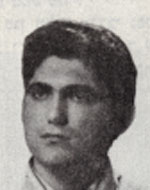Mordechai, son of Sarah and Chaim, was born on February 27, 1947, in a transit camp for Holocaust survivors near Rome, where his parents arrived after passing through seven sections of hell. Lived in Yaffo and Motti completed his elementary studies at the Yona Hanavi school and his high school studies at the Jaffa Municipal High School, an excellent student who had no difficulty standing in front of him and loved his studies and his future seemed safe. Mordechai was conscripted into the IDF in early August 1966 and assigned to the Armored Corps. After completing his basic training, he completed a series of courses in the Armored Corps, including a tank commander course. He was later assigned to an armored unit and participated in the Six Day War. Moti added and completed an officers’ course and an armored officers course. His commanders finished his praises and described him as a good officer who controlled his department properly, thoroughly and with initiative. In particular, he noted his ascension during difficult moments during clashes in the canal area during the War of Attrition. In early August 1968, after six months of regular service, Moti was released from regular service. Immediately after his release, Moti continued his studies. Without any difficulty, he was accepted to Tel Aviv University and studied with the same thoroughness and devotion that made him unique. After being awarded a bachelor’s degree in accounting and economics, he began to work in the field of accountancy and also saw it as a force. He was a sports fan, played tennis and football. He enjoyed every day of his life and knew how to enjoy everything that came his way. In 1972, Moti married Shoshi and in August 1973 his eldest son Eldar was born. Everyone admired and loved him, for his personality radiated confidence and faith. It was known that Moti’s mind was balanced and everyone considered it. It was not a day that he did not contact his parents, who was totally attached to them and no decision was made, less important or less, without Moti’s measured advice. When the Yom Kippur War broke out, he was summoned to report to his unit. He separated from his wife and eight-week-old son and joined the unit in Sinai. On October 9, 1973, his tank was hit in the battle that took place in the central sector of Sinai. Moti gave an order to leave him and joined his crew in another tank. While he was commanding the second tank, exposed in the turret, the tank was hit and Mutti was killed. He was laid to rest in the military cemetery in Kiryat Shaul. He left behind a wife and son, parents and brother. For his courage and courage on the battlefield, Moti received a commendation on behalf of the division commander: “I commend the 964874 Lieutenant Zilber Mordechai for his courage, resourcefulness and dedication to the mission. In the Yom Kippur War, Lieutenant Colonel Mordechai Zilber served as commander of the tank division in the battles of the central sector of the Suez Canal, and on October 9, 1973, during the fighting, Lieutenant Zilber Zilber moved in his tank to an area exposed to fire The enemy, in order to better target the enemy tanks, which advanced towards him. Later on his tank was hit and he was killed. In his actions, Lieutenant Mordechai Zilber revealed courage, resourcefulness and dedication to the mission. In a letter of condolence to the bereaved family, his commander wrote: “Lieutenant Lt. Zilber Mordekhai fell in battle during his service in the Battle of Maoz TV on Tuesday, October 9, 1973. Your husband, Lieutenant Mordechai, As commander of the tank division for battle. Your husband was courageous, resourceful and cool in the battle of the central sector of Sinai. Mordecai’s image will forever be remembered in our memory, his comrades in arms. In my name and in the name of all the soldiers of the unit, I express our deep sorrow and we share in your grief. Soldiers like your husband ordered us to live. “And a light in the book “In Memory of Them,” published by the Brigade in memory of its fallen soldiers during the Yom Kippur War.
